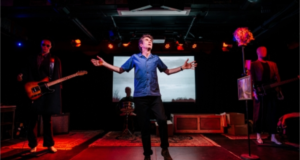Ryan Craig, David Greig, Zinnie Harris, Diana Son and Colin Teevan
Directed by Nicolas Kent
★★★
Pros: A fascinating commentary on the influences and dangers of nuclear weapons in the modern world.
Cons: A shame it is truncated into two productions – it seems bizarre not to present the origins of the bomb alongside its consequences. Sometimes feels like too much of a geopolitics lecture.
Our Verdict: An urgent and interesting production overall, and a fitting swansong for Nicolas Kent.
 |
| Courtesy of Alastair Muir for the Daily Telegraph |
No-one can doubt the profound effect that nuclear weapons have had on our recent history, and the ways in which they continue to shape international relations to this day. It was less than 70 years ago that Hiroshima was destroyed by the first nuclear bomb, and it is easy to forget that the world existed on a knife-edge until just 20 years ago when the Soviet Union collapsed. Therefore, the whole idea of staging a production about the bomb is pertinent, if for no other reason than to remind us just how much they still influence the way people live on this planet. The question is, does the Tricycle’s two-part exhibition of new writing around the subject engage the audience enough to fulfil this purpose, or does it fall short?
The Bomb is a two-parter, with the First Blast dealing with the proliferation and origin of nuclear weapons, and the Second Blast focussing on their consequences and the ways in which they shape the world today. They are played on alternate nights, and each is composed of five pieces of new writing, by different authors, delving into different aspects of these topics. The format is an interesting one, and in theory a great way of framing the discussion, but in practice there are few people who will have the time or who are sufficiently interested in the topic to return to the Tricycle on consecutive nights to witness the production in full. I imagine that the vast majority of spectators will only ever see one of the two halves on offer. I for one certainly thought that it would have been better to combine the two ‘Blasts’ into one more comprehensive (and compelling) production.
We haven’t seen the First Blast, but we took ourselves off to see the Second Blast focussing on Present Dangers. Of the five plays we saw there are thankfully no flops, but there are certainly some which are better than others. For me, the most interesting piece was The Letter Of Last Resort by David Greig, which dealt with the paradox of using nuclear weapons as a deterrent. To accomplish this, Greig imagines the first day in the job for a UK Prime Minister, who discovers she must write orders for the Captain of a Trident submarine in the event of a crippling nuclear strike on Britain. Although it could have been a little shorter, this was a fascinating insight into the rationale behind having a nuclear programme. This was also the only piece which was not directly linked to the nuclear ambitions of Israel, Iran, North Korea and the USA and the dangers surrounding them. Although this is of course relevant and fascinating, one cannot help feeling that in places, the Second Blast was a more of a lecture in modern geo-politics rather than a discussion about the bomb itself.
In terms of the staging, the company deliver some excellent performances, albeit with some dodgy accents here and there. Particular mention goes out to Paul Bhattacharjee who delivers some excellently composed performances in his roles as an Iranian secret police member in There Was A Man. There Was No Man. and as an Iranian Nuclear Scientist in Talk Talk Fight Fight. Belinda Lang also offers a superb performance as the Prime Minister in The Letter of Last Resort, and David Yip delivers some cracking laughs as an absurd North Korean General. Overall, there are strong performances in each of the pieces, and credit must go to the cast for seamlessly jumping in and out of the varied and multiple roles they play throughout the evening.
The Bomb is a fascinating project, and it leaves the audience’s minds racing. There is much to discuss in the debate around nuclear weapons, and many parts of this debate are touched upon in the Second Blast. It is a shame however that the production as a whole is truncated, because many of the most interesting arguments which apply today find their roots in the history and origins of the bomb. When seen together, the First Blast and Second Blast must be a hard-hitting synthesis of 70 years of nuclear threat, but alone, the Second Blast feels like it lacks context, and the focus on the situation in the Middle East eventually becomes overbearing. Nonetheless, anyone with half an opinion about nuclear weapons will enjoy this, and those without an opinion will benefit greatly from it. This urgent and compelling production is a fitting farewell to the Tricycle’s artistic director Nicolas Kent.
Please feel free to leave your thoughts and comments in the section below!
The Bomb (First and Second Blasts) runs at the Tricycle Theatre until 1st April 2012.
Box Office: 020 7328 1000 or book online at http://www.tricycle.co.uk/festivals/the-tricycle-goes-nuclear/
 Everything Theatre Reviews, interviews and news for theatre lovers, London and beyond
Everything Theatre Reviews, interviews and news for theatre lovers, London and beyond


